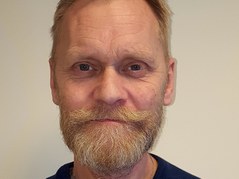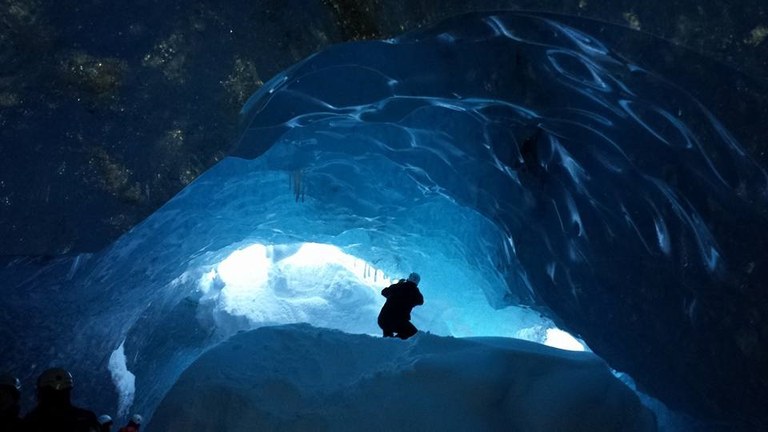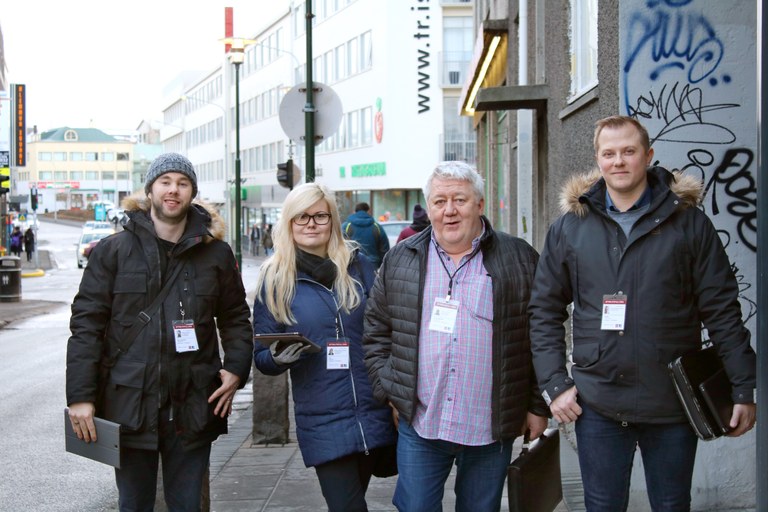Iceland: Tourism boom leads to flourishing black market
The Icelandic dream turned into a nightmare, says a Polish woman. Eastern European bus drivers work for 500 euro a month. Hotels suspected of employing asylum seekers. People trafficking suspected as two people worked around the clock in a basement. These are headlines from Iceland.
Tourism has become Iceland’s most important trade, set to grow by around 25 percent in 2016-2017. Thousands of new jobs are being created – and mainly filled by foreign labour, especially from Eastern Europe but also by young volunteers from Western Europe. The new employees do not know their rights in the Icelandic labour market. The risk is they will not be paid according to Icelandic collective agreement and end up not paying tax in Iceland.
Nobody knows exactly how common black market labour is, but numbers from the Icelandic Directorate of Labour, Vinnumálastofnun, show that 10 percent of foreign workers in Iceland do not have a personal identification number, and the figure could be as high as 32 percent in some sectors of the tourism industry. Workers with no personal identification number are not counted in statistics. The number is a prerequisite if you want work and be paid according to Icelandic legislation.
Personal contact
Trade unions are fighting against the black market economy by organising checks across Iceland. Union representatives are focusing on jobs in the tourism, hotel and restaurant trades as well as in the construction industry. All workers should have a personal identification number and be paid according to collective agreements.
 Hjalti Tómasson is carrying out workplace controls on the south coast of Iceland. He believes it is common to work in the black market in Iceland. He says trade union representatives in one instance entered a workplace with ten people. Before they had had time to talk to all the workers, six of them had disappeared because they did not want to talk to the union.
Hjalti Tómasson is carrying out workplace controls on the south coast of Iceland. He believes it is common to work in the black market in Iceland. He says trade union representatives in one instance entered a workplace with ten people. Before they had had time to talk to all the workers, six of them had disappeared because they did not want to talk to the union.
“They probably had something to hide,” says Hjalti Tómasson.
“We have also entered workplaces where everyone disappears as we arrive,” he adds.
Trade union representatives sometimes visit workplaces together with the police, representatives from the Icelandic Directorate of Labour and representatives from the tax authorities. Hjalti says they will block all exits and hold back anyone trying to leave.
“Black market work is far more common than you might think,” he says.

An ice cave in Iceland. No workplace controllers here. Yet.
The trade unions are worried about how prevalent black market workers have become, and are hiring more and more people to perform workplace controls. Their representatives go from hotel to hotel and from restaurant to restaurant – not only in Reykjavik but also in more rural areas, to check whether employees’ rights are being respected, and that the foreign workers are paid properly.
“We are working hard with the workplace checks. Our representative visits different workplaces, talks to the staff, tells the employees about their rights, answers questions and leaves leaflets in the workplace,” explains Halldóra Sigríður Sveinsdóttir, President of the Báran trade union.
Immediate dismissal
She emphasises the importance of talking to the employees. Personal contact is important when you want people to start thinking about their rights.
“They send emails and call once they have read the leaflets and discover that they have rights which are being ignored,” she continues.
Hjalti Tómasson from the workplace control is worried black market labour has become accepted as an integral part of Iceland’s tourism industry. He underlines that workers travel to Iceland in good faith. They believe the company has sorted out all the formalities according to the rules and they do not know about their own rights.
“When the employees later in all innocence ask about their rights, they are immediately dismissed. This is completely unacceptable,” says Hjalti Tómasson.
No angry mother
He underlines that foreign workers often are completely alone in Iceland. They do not know anybody who might help them. If they are given the sack, the often loose out on wages due to them. The employer knows that the workers do not have any family in Iceland. The employees might only know one person, and that is the employer.
“Sadly, there will be no phone call from an angry mother if you fail to pay salaries according to the collective agreement,” says Hjalti Tómasson.
Poles represent the largest minority in Iceland. Project leader Dröfn Haraldsdóttir at the Icelandic Confederation of Labou (ASÍ) reckons Poles now do know their rights in Iceland. But new groups of people are arriving from Bulgaria, Romania and Albania, and they do not know the rules of the Icelandic labour market. They sometimes struggle.
Increasing the chance of finding work at home
The Icelandic labour market also receives young volunteers from Western European countries. They consider working in Iceland an opportunity to travel cheap and improve their CV. This improves their chances of finding work in their home countries. But volunteer work is sadly often in breach of Icelandic legislation.
“We had a volunteer who had been working in the same kindergarten for two and a half years. Clearly this is giving the person a role as some kind of preschool teacher. That is not OK,” says Dröfn Haraldsdóttir. She says the regulations are now being changed to make things clearer.

The trade union control team in Reykjavik centre: Kristinn Örn Arnarson, Marlgorzata Katrín Molenda, Tryggvi Marteinsson and Óskar Hafnfjörð Gunnarsson. Photo: Herdís Steinarsdóttir/Fréttablað Eflingar
Tryggvi Marteinsson (third from the left above) works with workplace control for the Efling trade union. He underlines that the union’s representatives have visited three times as many workplaces in 2016 as they did in 2015. More will receive a visit in 2017, as the trade unions are currently hiring more controllers.
Tryggvi believes that Efling will have many conversations in the autumn when foreign summer temps have stopped working after the summer. That is when many of them start looking into their rights.
Busses from Europe
But trade unions are not alone in fighting the black market within the tourism industry. The Icelandic Travel Industry Association, SAF, has been focussing on foreign busses and bus drivers coming in on the ferry from Bergen each summer. The busses stay in Iceland for the duration of the summer, and the drivers work outside of Icelandic legislation and regulations.
SAF project leader Gunnar Valur Sveinsson says nearly ten buses were driving illegally in Iceland in 2016. He thinks the number will be higher in the summer of 2017, and talks about social dumping.
“Busses with foreign drivers who are paid far less than other bus drivers in Iceland are coming here. That creates unfair competition,” says Gunnar Valur Sveinsson.
“We believe the bus drivers should have the same wage conditions as all the other bus drivers in Iceland,” he continues.
“We will make sure that happens,” he says.
SAF Managing Director Helga Árnadóttir underlines that the majority of their members in the hotel and restaurant trade follow Icelandic rules and regulations. She believes the government should create legislation and regulations to ease the the fight against Airbnb and against illegal activity within the hotel trade.
Is it a stain on the tourism industry when employers don’t pay according to laws and regulations?
"Yes, it is absolutely unacceptable when most companies do respect laws and regulations, while some don’t. We demand that all those who work within the tourism industry share an even playing field,” she says.
- Gold at the end of the rainbow?
-
Icelandic nature attracts tourists from all over the world. Workers follow, but working conditions are not always optimal. Here tourists have walked to the 25 meters wide and 60 meters tall Skógafoss, considered to be one of Iceland’s most beautiful waterfalls. According to an old saga, Þrasi Þórólfsson, the first Viking settler in the area, hid a gold treasure behind it.
 Follow us on Facebook
Follow us on Facebook
